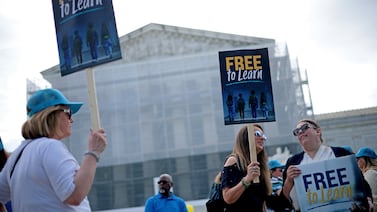Sign up for Chalkbeat’s free weekly newsletter to keep up with how education is changing across the U.S.
Congress is trying to ban TikTok. The U.S. House of Representatives overwhelmingly passed a resolution that gives TikTok owner Byte Dance, a Beijing-based tech company, six months to sell the app or see it banned in the United States. Lawmakers have raised data privacy and national security concerns because of the foreign ownership of such an influential social media app. Opponents of a ban say there is nothing unique about TikTok — that all social media platforms have positive and negative features.
About two-thirds of U.S. teens say they use TikTok, according to Pew Research Center, with 17% saying they are on the app almost constantly. While there are big worries about the mental health impacts of social media use, people also use TikTok as a creative outlet and to stay connected with friends.
We want to hear from students about how a TikTok ban would affect them.
Please take a few minutes to fill out the survey below, and let us know if we can follow up with you. We’ll keep your information confidential, and only publish your answers if you tell us it’s OK.
Not a student but know one who might have something to say? Please send them this survey.
Having trouble viewing the form? Click here.
Erica Meltzer is Chalkbeat’s national editor based in Colorado. Contact Erica at emeltzer@chalkbeat.org.





